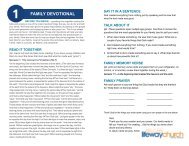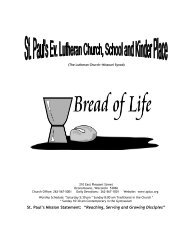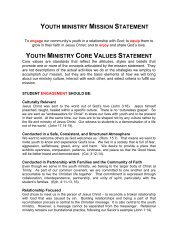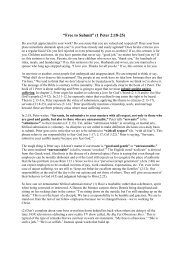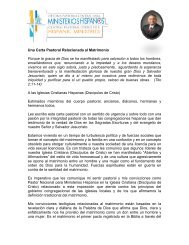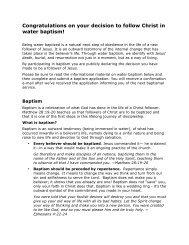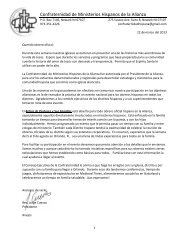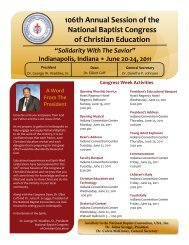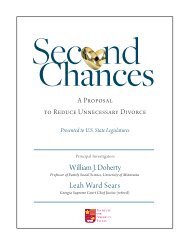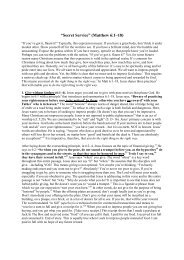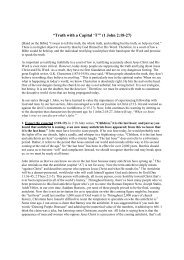“From Mina League to Major League” (Luke 19:11-27) - Razorplanet
“From Mina League to Major League” (Luke 19:11-27) - Razorplanet
“From Mina League to Major League” (Luke 19:11-27) - Razorplanet
You also want an ePaper? Increase the reach of your titles
YUMPU automatically turns print PDFs into web optimized ePapers that Google loves.
<strong>“From</strong> <strong>Mina</strong> <strong>League</strong> <strong>to</strong> <strong>Major</strong> <strong>League</strong>” (<strong>Luke</strong> <strong>19</strong>:<strong>11</strong>-<strong>27</strong>)<br />
You hear it again and again in sports, business, and education: “He or she had so much potential.” It is a<br />
phrase usually spoken about someone who failed <strong>to</strong> do what was expected or what others perceived was<br />
possible. The words may be applied <strong>to</strong> the highly <strong>to</strong>uted college star, the gifted (but lazy) student, the<br />
talented but recklessly indulgent ac<strong>to</strong>r or actress, or the savvy businessperson with no people skills. It is<br />
the sad s<strong>to</strong>ry of “what might have been.” 1<br />
In the spiritual realm, God has given every Christian unlimited potential. Sadly, many Christians will<br />
never realize their God-given potential. Instead, they will always wonder “what might have been.”<br />
Fortunately, you may be living up <strong>to</strong> your potential in Christ. If so, this message will encourage you.<br />
However, if you recognize that you are not currently living up <strong>to</strong> your potential in Christ, there is hope.<br />
By God’s grace, you can decide <strong>to</strong>day <strong>to</strong> change the course of your life. “He or she had so much<br />
potential” doesn’t have <strong>to</strong> be your epitaph. Rather, you can live up <strong>to</strong> your full potential in Christ and<br />
fulfill His dreams for your life.<br />
In the parable that we’re going <strong>to</strong> look at, we will study three slaves who exhibit three different responses<br />
<strong>to</strong> their God-given potential. But first, let’s set the context (<strong>Luke</strong> <strong>19</strong>:1-10). Jesus has been traveling<br />
around proclaiming good news. On His way <strong>to</strong> Jerusalem, He passes through Jericho and encounters a<br />
chief tax collec<strong>to</strong>r. 2 Zacchaeus is rich, short, and empty. He longs <strong>to</strong> see Jesus so he climbs up in a<br />
sycamore tree so that he can catch sight of Jesus as He comes through <strong>to</strong>wn. Upon His arrival, Jesus<br />
immediately calls Zacchaeus down from the tree and says, “Zacchaeus, hurry and come down, for <strong>to</strong>day I<br />
must stay at your house.” Filled with joy, Zacchaeus responds, “Behold, Lord, half of my possessions I<br />
will give <strong>to</strong> the poor, and if 3 I have defrauded anyone of anything, I will give back four times as much.”<br />
Jesus tells Zacchaeus and all the onlookers that “salvation has come <strong>to</strong> his house.”<br />
The parable that Jesus tells evidently takes place in the home of Zacchaeus. It is designed <strong>to</strong> encourage<br />
Zacchaeus <strong>to</strong> continue in his faithful and generous course of action. 4 It also serves <strong>to</strong> remind and motivate<br />
you and me that we only have one life <strong>to</strong> live and we must live it <strong>to</strong> the fullest. Jesus’ bot<strong>to</strong>m line is this:<br />
If we don’t use what we’ve been given we will lose it. Or, if you prefer, “Use it or lose it.” Please turn <strong>to</strong><br />
<strong>Luke</strong> <strong>19</strong>:<strong>11</strong>-<strong>27</strong> 5 where we will be struck by two warnings 6 from Jesus.<br />
1. Invest your life while Christ is away (<strong>19</strong>:<strong>11</strong>-14). <strong>Luke</strong> provides an introduction <strong>to</strong> Jesus’ parable in<br />
<strong>19</strong>:<strong>11</strong>: “While they were listening <strong>to</strong> these things, Jesus went on <strong>to</strong> tell a parable, because He was<br />
near Jerusalem, and they supposed that the kingdom of God was going <strong>to</strong> appear immediately.”<br />
Jesus is moving <strong>to</strong>ward Jerusalem for the great Triumphal Entry (<strong>19</strong>:28-48). The excitement is building.<br />
The disciples and many of the people believe that this is the “moment of truth”—the time when Jesus will<br />
institute His earthly kingdom. 7 However, this assumption is mistaken. The disciples and the crowd didn’t<br />
realize that Jesus would suffer and die, be raised again, ascend in<strong>to</strong> heaven, and that many years would go<br />
by before He returned <strong>to</strong> establish His kingdom. Therefore, Jesus will explain that the coming of His<br />
kingdom will be delayed. 8 He wants <strong>to</strong> let His hearers know what they are supposed <strong>to</strong> be doing in His<br />
absence. Thus, we must be prepared for a lengthy period of delay in which we are <strong>to</strong> faithfully serve<br />
God. 9<br />
Now in <strong>19</strong>:12, Jesus begins His parable: “A nobleman went <strong>to</strong> a distant country <strong>to</strong> receive a kingdom<br />
for himself, and then return.” 10 Theologically, this parable alludes <strong>to</strong> the experience of Jesus in a<br />
number of ways: (1) Jesus was born of noble birth in that He was divinely conceived (cf. 1:31-33). (2)<br />
After Jesus’ death and resurrection, He ascended <strong>to</strong> heaven <strong>to</strong> receive His kingship (cf. 24:50-51; Acts<br />
1:9-12). (3) After an interval, Jesus will return and make visible that kingship (cf. 21:<strong>27</strong>; Acts 1:9-12). <strong>11</strong><br />
The correctness of these identifications becomes clearer as the parable unfolds.
In <strong>19</strong>:13, Jesus continues His parable: “And he [the nobleman] called ten of his slaves, and gave them<br />
ten minas and said <strong>to</strong> them, ‘Do business with this until I come back.’” Ten is apparently a round<br />
number representing all of the nobleman’s slaves. Jesus did not mean just His twelve disciples. This<br />
description of ten slaves refers <strong>to</strong> all believers. Jesus pictures His slaves as inves<strong>to</strong>rs who are responsible<br />
<strong>to</strong> “do business” (i.e., invest the mina) during His absence. They are not supposed <strong>to</strong> sit around waiting<br />
for Him <strong>to</strong> return. Rather, they are <strong>to</strong> be actively doing business for Him with what He entrusted <strong>to</strong> them,<br />
for the day will certainly come when He will return. At that time, each slave must give an account for<br />
what he has done.<br />
Notice the nobleman gives each of his ten slaves one mina. A mina was a bag of coins, usually silver, that<br />
weighed approximately one pound. 12 From the marginal note found in the NASB we can learn that a mina<br />
was equivalent <strong>to</strong> nearly 100 days’ wages. 13 The nobleman’s purpose was not merely increasing his<br />
wealth. His overarching purpose was one of testing <strong>to</strong> see which of his slaves would be worthy of greater<br />
responsibility in his kingdom when he returned. 14<br />
Theologically, the mina seems <strong>to</strong> represent life’s potential. 15 Every Christian receives the same sum<br />
representing the one life that each has <strong>to</strong> invest for Christ. 16 Since it is baseball season, we can call this<br />
“mina league.” The mina league—our earthly responsibilities—prepares us for the major league—our<br />
eternal responsibilities. Thus, our earthly lives serve a dual purpose. We are carrying out God’s will <strong>to</strong><br />
please Him in everything we do (Col 3:17, 23). But we are also in training for our eternal assignments.<br />
Earth is our temporary world <strong>to</strong> prepare us for the everlasting kingdom. By living each day <strong>to</strong> please God,<br />
we can make <strong>to</strong>day count for eternity. This is why we need <strong>to</strong> view our lives not in terms of seventy or<br />
eighty years on earth, but in light of forever. The end of this life is the beginning of the next. 17 Therefore,<br />
we must use this life for God’s purposes.<br />
Pretend you are given a bank account that receives a fresh deposit of $86,400 every day. You are free <strong>to</strong><br />
spend the money any way you want, but the unspent balance is not carried forward <strong>to</strong> the next day.<br />
Regardless of what you’ve spent by the end of the day, the balance is reset daily at $86,400. What would<br />
you do with such a bank account? Now consider the fact that each dollar represents the number of<br />
seconds in one day: 24x60x60= 86,400 seconds. Once they are “spent” they disappear; and the balance is<br />
reset at 12:00:01 a.m. every day.<br />
Some people become slaves of what they have, living frantic lives, trying <strong>to</strong> spend time, talent, and<br />
treasure before they lose it. In so doing, they become servants of things that are supposed <strong>to</strong> serve them.<br />
Jesus said we cannot serve both God and money (things of this world). And the only way <strong>to</strong> keep our<br />
priorities straight is <strong>to</strong> have a wise, godly plan: Today I’m going <strong>to</strong> glorify God this way with my time,<br />
talent, and treasure. Do you have such a plan? 18<br />
In <strong>19</strong>:14, Jesus says, “But his citizens hated him and sent a delegation after him, saying, ‘We do not<br />
want this man <strong>to</strong> reign over us’” (cf. Matt 22:6; Acts 17:7). These citizens represent unbelieving Jews.<br />
Jesus was near Jerusalem, and in a few days He would hear the Jews protest <strong>to</strong> Pilate, “We have no king<br />
but Caesar!” (John <strong>19</strong>:15) In other words, “We will not have this man reign over us!” <strong>19</strong> The Jews, and<br />
particularly their religious leaders, resisted Jesus’ rightful claim <strong>to</strong> be their King. But beyond this<br />
his<strong>to</strong>rical reality, this verse also represents this evil world that is hostile <strong>to</strong>ward God and does not want <strong>to</strong><br />
submit <strong>to</strong> Jesus as King. It is in this hostile world that we are <strong>to</strong> “do business” with the mina that Jesus<br />
has given us. What a reminder that serving the Lord is not easy. There will be opposition. Undoubtedly,<br />
the slaves in <strong>Luke</strong> were not popular with those who hated the King. Likewise, when we stand with Jesus<br />
we will become a target <strong>to</strong> some. The apostle Paul recognized this and wrote, “Therefore be very careful<br />
how you live—not as unwise but as wise, taking advantage of every opportunity, because the days are<br />
evil” (Eph 5:15-16, NET).
It is not difficult <strong>to</strong> understand the s<strong>to</strong>ry thus far, nor is it difficult <strong>to</strong> see its meaning with reference <strong>to</strong><br />
Jesus’ departure, rejection, and return. Like the nobleman, Jesus came <strong>to</strong> the earth with great position and<br />
power. Like the nobleman, Jesus’ power greatly increased as a result of His departure. Jesus was rejected<br />
by men, hung on a cross, put <strong>to</strong> death, buried, raised, and then ascended <strong>to</strong> heaven, where He now is<br />
seated at the right hand of God. Jesus’ power is now even greater than it was when He first came <strong>to</strong> the<br />
earth (cf. Phil 2:9-<strong>11</strong>). His return <strong>to</strong> reign over His kingdom has been delayed (from our human<br />
perspective), but He will surely come. 20<br />
2. Remember your life will be judged (<strong>19</strong>:15-<strong>27</strong>). In <strong>19</strong>:15, the king returns and deals with his slaves.<br />
Jesus says, “When he [the nobleman] returned, after receiving the kingdom, he ordered that these<br />
slaves, <strong>to</strong> whom he had given the money, be called <strong>to</strong> him so that he might know what business they<br />
had done.” 21 In <strong>19</strong>:15, there is an allusion <strong>to</strong> the second coming of Christ and His visible reign. 22 No<br />
longer is Jesus seen as the rejected King, He is seen as the King of all the earth who will judge His slaves.<br />
In <strong>19</strong>:16-26, the spotlight falls on three of the ten slaves. It is likely that the chosen three represent the<br />
differing degrees of faithfulness from the ten slaves. The three slaves receive three grades: A, C, and F.<br />
In <strong>19</strong>:16, the first slave appears saying, “‘Master, your mina has made ten minas more.’” This first<br />
slave gained 1,000 percent on his master’s mina. He was a faithful and effective slave. He also wisely did<br />
not take the credit for his success. He did not say, “Master, my great business skill has multiplied your<br />
mina.” Rather, he ascribes the increase <strong>to</strong> his master who gave him the mina.<br />
The nobleman responds <strong>to</strong> the first slave by saying, “Well done, good slave, because you have been<br />
faithful in a very little thing, you are <strong>to</strong> be in authority over ten cities” (<strong>19</strong>:17). This first slave hears<br />
the commendation that every Christian longs <strong>to</strong> hear, “Well done, good slave!” Now this may not seem<br />
very important <strong>to</strong> us right now; but I can assure you that in eternity this will be our greatest desire. Think<br />
about it: Every one of us would like <strong>to</strong> think that our parents were proud of us and approved of the way<br />
we lived our lives. Some people ache for this illusive approval. Imagine how much more we will yearn<br />
for the “Well done!” of Jesus. In that day, we will have glorified bodies that are free from sin and<br />
selfishness. Consequently, all that we will care about is hearing words of approval from our heavenly<br />
Master. And these words will not be short-lived; rather they will resound in our ears for all eternity.<br />
In addition <strong>to</strong> verbal commendation, Jesus alludes <strong>to</strong> another reward—authority over cities. Faithfulness<br />
and effort in “a very little thing” will bring huge returns in the kingdom. Too often we think that we must<br />
do great things, big things, but it is the many small things in life that count.<br />
• It is being a man or woman of character when no one is looking. When that television show or<br />
movie comes on that your flesh longs <strong>to</strong> watch, you squelch that temptation and honor God with<br />
your mind and heart.<br />
• It is listening <strong>to</strong> someone at church or work when you really don’t have time in your schedule <strong>to</strong><br />
do so. Even though one eye is on your watch, you strive <strong>to</strong> care, express concern, and<br />
demonstrate the love of Christ.<br />
• It is sharing your faith when you are afraid. This school year, the Lord will give you the<br />
opportunity <strong>to</strong> talk about Him with some of your classmates, but discouragement and persecution<br />
may follow. Faithfulness is sharing Christ anyway.<br />
• It is refusing <strong>to</strong> fight with your spouse. Remember, it takes two <strong>to</strong> argue. When your spouse<br />
“lights you up” with some criticism, take it like a man or woman and graciously back down. This<br />
takes enormous strength and self-control. But it demonstrates faithfulness <strong>to</strong> Christ.<br />
• It is serving in the church behind the scenes. You may be asked <strong>to</strong> make a meal for someone in<br />
need, serve on the sound and video team, or work in the nursery. While there will be no glory in<br />
your service, God will be pleased and you will be faithful in a very little thing.
The truth is we will never be used greatly by God until we are faithful in what He has given us <strong>to</strong> do now.<br />
It is in the little things of life that we show whether or not we can handle the big things. If you don’t put<br />
the Lord first in your present finances, you won’t put Him first when you have more. If you don’t fulfill<br />
your present commitments, there is no reason <strong>to</strong> believe you will fulfill greater commitments. If you can’t<br />
handle the influence you presently have, you will not receive more. The way you handle the little things<br />
shows your character.<br />
Fred Craddock tells this s<strong>to</strong>ry about a wealthy man who “went <strong>to</strong> his priest with a check for fifty thousand<br />
dollars made out <strong>to</strong> the church. He handed the check <strong>to</strong> the priest and the priest looked at it. It was a lot of<br />
money! Then the priest handed it back and said, ‘Go cash it in. Cash it in for quarters or dollar bills and<br />
spend fifty cents or a dollar at a time doing the Lord’s work.’ The man exclaimed, ‘But that will take the<br />
rest of my life!’ ‘That’s right!’ answered the priest. ‘That is the point!’” 23<br />
• If you are a widow who has been a wonderful wife and mother, will you remain faithful <strong>to</strong> daily<br />
trust the Lord with your finances? Even though it doesn’t look like you’re going <strong>to</strong> make it this<br />
month, will you cling <strong>to</strong> Christ and pray that He will see you through?<br />
• If you are a teenager, will you put the Lord’s interests over your own? In your pursuit of<br />
acceptance and friends, you may have <strong>to</strong> compromise yourself. Will you say <strong>to</strong>day that it just<br />
isn’t worth it? Instead, will you ask the Lord <strong>to</strong> meet your needs and help you find friendships<br />
that will strengthen you?<br />
• If you are married, will you spiritually lead your children in the knowledge of God? Will you<br />
daily read the Scriptures <strong>to</strong> them? Will you pray with them every night?<br />
In <strong>19</strong>:18, the second slave appears saying, “Your mina, master, has made five minas.” The nobleman<br />
said <strong>to</strong> this slave, “And you are <strong>to</strong> be over five cities” (<strong>19</strong>:<strong>19</strong>). This second slave had also been faithful,<br />
but he only earned a 500 percent return on his master’s mina. This slave likely achieved half of what his<br />
master had for him <strong>to</strong> accomplish. He did not receive any verbal commendation, but like the first slave,<br />
his reward is proportionate <strong>to</strong> his service. This shows that rewards will vary depending on a slave’s<br />
overall faithfulness.<br />
In the Christian life, some might serve Christ halfheartedly for their entire lives. Others might serve Him<br />
wholeheartedly for half of their Christian lives. Still others might run hot and cold again and again. 24<br />
Generally, this is true of most Christians. Maybe you’ve attended Bible college or are a former elder or<br />
ministry leader, yet your life has been filled with spiritual inconsistency. You know that if Jesus returned<br />
<strong>to</strong>day, you would not be clicking on all cylinders. God wants you <strong>to</strong> repent and be fully res<strong>to</strong>red <strong>to</strong> Him.<br />
In <strong>19</strong>:20-26, a third slave enters the picture. The first two slaves received two verses of ink, but this third<br />
slave earns seven verses. Since Jesus knows that many Christians will share a lot in common with this<br />
third slave, He makes him the central figure of the parable. 25 In <strong>19</strong>:20-21, this slave approaches his master<br />
and offers the following explanation: “Master, here is your mina, which I kept put away in a<br />
handkerchief; for I was afraid of you, because you are an exacting man; you take up what you did<br />
not lay down and reap what you did not sow.” This third slave reveals that he has not earned anything<br />
with his master’s mina. After being given the mina, this third slave “played it safe” by s<strong>to</strong>ring his mina<br />
away in a handkerchief or “sweat cloth.” 26 Farmers used these “sweat cloths” in the fields when they were<br />
working. But this slave’s sweat cloth is not sweaty! Going back <strong>to</strong> the introduction in <strong>19</strong>:<strong>11</strong>, this third<br />
slave personifies the problem that Jesus is addressing—the problem of thinking that the kingdom is<br />
imminent. By “playing it safe,” this slave “played the end against the middle.” If his master returned, he<br />
could offer him his mina, but if he didn’t return this slave saved himself a whole lot of sweat. This third<br />
slave reasons away his laziness by saying, “Boss, you are a man who expects <strong>to</strong> get blood out of a s<strong>to</strong>ne.<br />
You’re ruthless and demanding. And I’m afraid of you.”
This third slave explains that his fear of the master was responsible for his lack of fruit (cf. Matt 25:25).<br />
Now it was appropriate for him <strong>to</strong> fear the master since he would eventually bring his slaves <strong>to</strong> account,<br />
but the slave’s action in view of his fear of the master was improper. Instead of letting fear paralyze his<br />
actions, the servant should have let fear motivate him <strong>to</strong> act wisely. He should have gotten busy and<br />
served the master since he feared him. His assessment of the master was correct, but it did not have the<br />
proper effect on him. God seeks a disproportionately high return on His investments, so the slave’s<br />
conservatism was sinful. He appears <strong>to</strong> have felt that he would receive no reward for his work for the<br />
master if he ever returned. He should have taken some risks. Faithful stewardship involves taking<br />
calculated risks.<br />
There is no such thing as standing still in the Christian life…you are progressing or regressing. The<br />
person who is growing will be given increasing opportunity, blessing, and responsibility. The person who<br />
is coasting will find joy decreasing, effectiveness diminishing, and compromise increasing…they will<br />
lose ground. This slave represents the believer who does nothing of eternal value with his or her life. Like<br />
many believers <strong>to</strong>day who are not concerned about the Lord’s business or the Lord’s return.<br />
In <strong>19</strong>:22-23, the master responds by saying, “By your own words I will judge you, you worthless slave.<br />
Did you know that I am an exacting man, taking up what I did not lay down and reaping what I did<br />
not sow? Then why did you not put my money in the bank, and having come, I would have collected<br />
it with interest?” The master said he would judge the slave on the basis of his own words, namely, that<br />
the master was an exacting man who demanded much from his slaves. I will often use my children’s<br />
words against them. After my children disobey and I discipline them, I will ask, “Do you understand that<br />
if you talk back <strong>to</strong> me again, I will spank you again?” As I am talking with my children, I make sure that<br />
they understand the consequences of their actions. They can’t nod their head or mutter or murmur in<br />
reply. They must say, “Yes, Daddy, I understand that if I disobey again there will have <strong>to</strong> be further<br />
discipline.” Naturally, ten seconds later, a second act of disobedience occurs and I have <strong>to</strong> refer the child<br />
<strong>to</strong> his or her previously uttered words. This is justice. Yet, the convicting thing is that the Lord will also<br />
do the same thing <strong>to</strong> me. He will use my own commitments and promises <strong>to</strong> bring me in<strong>to</strong> account. This<br />
is a disturbing prospect.<br />
Rather than commending this third slave, the master rebukes him calling him a “worthless slave.” By this,<br />
the master means that he is “unproductive” (cf. Jas 2:14, 16, 20, 26). He has produced nothing of value.<br />
The master’s character should have moved the slave <strong>to</strong> productive service rather than passive sloth. Even<br />
by depositing his investment in a bank the slave could have earned some interest for the master with little<br />
risk. <strong>27</strong><br />
It is easy <strong>to</strong> think that if we don’t serve God with what He’s given us, the worst that could happen would<br />
be no reward. But the truth of the third slave is that if we do not use what God has placed in our care for<br />
Him, we will suffer loss of both the potential reward we could have earned and the opportunity <strong>to</strong> serve<br />
God more fully in eternity. 28 Again, it is easy <strong>to</strong> think, “Ho-hum…no biggie…just as long as I make it<br />
in<strong>to</strong> heaven. I don’t care if I’m the chief bottle washer or <strong>to</strong>ilet plunger.” However, I must warn you; on<br />
that day we will all care and be very concerned about the quality of our eternal future.<br />
Another point worth making is that this third slave suggests that he is frightened by his master. Whether<br />
this is true or not, we don’t know. He may have been simply excusing his laziness. However, there is<br />
wisdom in having appropriate fear for God. After all, He is a holy God who runs the universe. We should<br />
have a healthy awe for His power and judgment.<br />
This past week during our family devotions, I asked my children if they feared me. Justin, my seven-year-<br />
old son said, “Dad, I fear you because in your love, you will discipline me!” What an answer! Justin<br />
understands a healthy fear for authority. He also recognizes how God operates (see Heb 12:6-<strong>11</strong>).
My prayer is that we will have a healthy fear of God. By this I mean that we should not be paralyzed by<br />
fear, but motivated <strong>to</strong> move from fear <strong>to</strong> faithfulness.<br />
In the Christian life, we don’t stand still. We use our life and make progress or we lose what we have. 29<br />
“Use it or lose it.”<br />
After rebuking the third slave, in <strong>19</strong>:24-26, the master and the bystanders engage in some interesting<br />
dialogue. The master turns <strong>to</strong> the bystanders and says, “Take the mina away from him [the third slave]<br />
and give it <strong>to</strong> the one who has the ten minas” (<strong>19</strong>:24). Ouch! This is going <strong>to</strong> get intense.<br />
After hearing the master’s ruling, the bystanders express concern with his decision. They cry out:<br />
“Master, he has ten minas already” (<strong>19</strong>:25). Of course, this arrangement appears unjust <strong>to</strong> the<br />
bystanders. They may think that the unfaithful slave’s mina should have gone <strong>to</strong> a slave with a smaller<br />
reward. They are looking at what seems best for the slaves, not for the master. Isn’t it funny that we tend<br />
<strong>to</strong> think that we are fairer than God? We pride ourselves in how gracious and sympathetic we are,<br />
assuming that we surpass God in these characteristics. How foolish we are!<br />
With ice-water in his veins, the master replies, “I tell you that <strong>to</strong> everyone who has, more shall be<br />
given, but from the one who does not have, even what he does have shall be taken away” (<strong>19</strong>:26).<br />
The master is distributing his gifts on the basis of faithfulness and capability, not fairness or need. For the<br />
unfaithful slave, life’s opportunities have been lost! His mina is gone. But he has no one <strong>to</strong> blame but<br />
himself. He was given the same potential as the other slaves. In life this is how things work. In our<br />
world…<br />
• The salesman who works hard will be given more terri<strong>to</strong>ry <strong>to</strong> make more sales.<br />
• The student who is diligent will continue <strong>to</strong> excel at learning while the lazy student will<br />
eventually find that they are unable <strong>to</strong> keep up.<br />
• The athlete who continues <strong>to</strong> work hard on the fundamentals will remain sharp and at the <strong>to</strong>p of<br />
their game, while the athlete who feels “good enough” will cease <strong>to</strong> be effective.<br />
• Those who train their bodies will work more efficiently and be more fit and stronger while those<br />
who neglect their bodies will lose their energy and be unfit.<br />
• Those who keep working at their spiritual life will discover more of God’s goodness and grace;<br />
those who become lazy in spiritual pursuits will slowly drift from the Lord.<br />
The master was operating on the principle that faithfulness with little indicates faithfulness in much (cf.<br />
8:18 with <strong>19</strong>:13, 17, 29, 26). Therefore it was <strong>to</strong> his advantage <strong>to</strong> give the unfaithful slave’s mina <strong>to</strong> the<br />
most faithful slave because he would make the best use of it. The master expressed this truth proverbially<br />
(<strong>19</strong>:26; 16:12). He was looking at what was best for himself. Obviously, what is best for God is more<br />
important than what is best for His slaves. Still the master’s action was also fair <strong>to</strong> his slaves since the<br />
slave who glorified the master most received the greatest reward. Zacchaeus, who was listening <strong>to</strong> this<br />
parable, had just promised <strong>to</strong> give half of his possessions <strong>to</strong> the poor and <strong>to</strong> reimburse anyone he had<br />
defrauded four-fold (<strong>19</strong>:8). Jesus’ teaching here would have encouraged Zacchaeus <strong>to</strong> follow through on<br />
his commitment. He would have a great reward, much treasure in heaven, if he so served the Master<br />
faithfully. This is equally true for each one of us.<br />
The bystanders in Jesus’ parable represent those who assist Jesus in carrying out His will, perhaps angels<br />
or other human servants. The unfaithful slave lost even what the master had given him. If the mina each<br />
servant received represents his life potential, this servant would lose that. The master gave it instead <strong>to</strong> the<br />
most faithful servant. This seems <strong>to</strong> mean that God’s faithful servants will receive additional<br />
opportunities <strong>to</strong> glorify Him in the next stage of their service as well as authority over others. The next<br />
stage of these servants’ service will be millennial service in the kingdom.
Jesus’ final words in <strong>19</strong>:<strong>27</strong> are rather alarming: “But these enemies of mine, who did not want me <strong>to</strong><br />
reign over them, bring them here and slay them in my presence.” 30 The strong adversative “but”<br />
(plene) contrasts the punishment of the unprofitable slave with that of the citizens (cf. <strong>19</strong>:14) who did not<br />
want him <strong>to</strong> rule over them. 31 His<strong>to</strong>rically, Jesus’ enemies (i.e., the Jewish people who crucified Him)<br />
were indeed destroyed by the Roman army at the fall of Jerusalem in A.D. 70 (cf. 21:6, 20-24; 23:28-31).<br />
Escha<strong>to</strong>logically, Jesus’ enemies (i.e., those who ultimately reject Him) will be consumed at His return<br />
(cf. 21:25; 22:66-70; cf. Rev <strong>19</strong>:<strong>11</strong>-<strong>19</strong>). The focus here refers <strong>to</strong> the Great White Throne judgment, which<br />
culminates in “the second death” for the unsaved (Rev 20:<strong>11</strong>-15). Will Jesus’ words mean reward, rebuke,<br />
or possibly retribution?<br />
This final verse prompts a critical question: “Are you a citizen or a slave?” Which are you? That is the<br />
most important distinction in the world. Your eternal destiny is determined by the decision you make here.<br />
Is Jesus the Messiah, the King of the earth, or is He one <strong>to</strong> be rejected? If He is the Messiah, then you are<br />
<strong>to</strong> be His slave and faithfully “do business” until the day that He returns. You become a slave by trusting<br />
in Jesus Christ as your Savior. Your eternal destiny is determined by whether you are a citizen or a slave.<br />
May you be a slave, for Christ’s sake, and yours. And if you are a slave, may you be a faithful slave, one<br />
<strong>to</strong> whom the Master can say, “Well done, good slave” (cf. <strong>19</strong>:16).<br />
George Boldt worked faithfully for years at the front desk in a small hotel. One day an elderly couple<br />
came in<strong>to</strong> the lobby and asked for a place <strong>to</strong> stay. Every room in the hotel—and every hotel in <strong>to</strong>wn—was<br />
occupied. Realizing that the elderly couple had nowhere <strong>to</strong> sleep, Boldt offered them his own room.<br />
Although they were reluctant <strong>to</strong> accept his offer, they eventually did so because George insisted. The next<br />
morning when the couple was checking out, the elderly man said <strong>to</strong> George, “You’re the kind of man who<br />
should be managing the best hotel in the country. Some day I’m going <strong>to</strong> build that hotel and let you<br />
manage it.”<br />
Several years later, Boldt received a letter in the mail. It contained a round-trip ticket and a note from the<br />
man <strong>to</strong> whom he had given his room years before. The man invited George <strong>to</strong> visit him in New York City.<br />
When Boldt arrived in New York, the gentleman <strong>to</strong>ok him <strong>to</strong> a down<strong>to</strong>wn corner where a huge building<br />
s<strong>to</strong>od. “George, this is the hotel I built for you <strong>to</strong> manage.” Boldt stared in amazement at the glorious<br />
structure. The hotel was the Waldorf-As<strong>to</strong>ria! The elderly man was William Waldorf As<strong>to</strong>r, one of the<br />
wealthiest men in the country. Boldt’s faithfulness in managing a small hotel had prepared him <strong>to</strong> manage<br />
one of the most magnificent hotels this country has ever seen.<br />
On judgment day, God will examine how well we managed our lives on earth. If we were faithful in<br />
fulfilling our responsibilities in this life, He will assign us better things <strong>to</strong> manage in the next life.<br />
God wants you <strong>to</strong> realize the significance of your earthly existence so you can live up <strong>to</strong> your fullest<br />
potential. Don’t believe the lie that your life isn’t important. The few brief moments you live on earth will<br />
determine your responsibilities for all eternity. You only get one shot at living on planet earth—your<br />
opportunity. 32 May we be faithful slaves <strong>to</strong> use what we’ve been given so that we may multiply the<br />
effectiveness of our lives for all eternity.<br />
Copyright © 2006 Keith R. Krell. All rights reserved. All Scripture quotations, unless indicated, are taken from the New American Standard Bible,<br />
© <strong>19</strong>60, <strong>19</strong>62, <strong>19</strong>63, <strong>19</strong>68, <strong>19</strong>71, <strong>19</strong>72, <strong>19</strong>75, <strong>19</strong>77, and <strong>19</strong>95 by The Lockman Foundation, and are used by permission.<br />
Permissions: Feel free <strong>to</strong> reproduce and distribute any articles written by Keith Krell, in part or in whole, in any format, provided that you do not<br />
alter the wording in any way or charge a fee beyond the cost of reproduction. It is our desire <strong>to</strong> spread this information, not protect or restrict it.<br />
Please include the following statement on any distributed copy: by Keith Krell, Timeless Word Ministries, 2508 State Ave NE Olympia, WA<br />
98506, 360-352-9044, www.timelessword.com
Scripture Reading<br />
<strong>Luke</strong> <strong>19</strong>:<strong>11</strong>-<strong>27</strong><br />
<strong>Luke</strong> <strong>19</strong>:1-10<br />
<strong>Luke</strong> 16:1-13<br />
Matthew 25:14-30<br />
Ephesians 1:13-14<br />
1 Corinthians 3:10-15<br />
1 Corinthians 4:1-5<br />
Study Questions<br />
1. The thrust of Jesus’ parable is that His disciples must be vigilant and faithful in His service (<strong>19</strong>:13, 15b-26).<br />
Overall, how have I invested in my life’s potential? Specifically, in what ways am I a vigilant and faithful<br />
slave? How can I grow as a slave of Christ? Who will help me in my maturing process?<br />
2. Jesus mentioned the importance of being faithful in “a very little thing” (<strong>19</strong>:17). What “things” have Jesus<br />
entrusted <strong>to</strong> me? What are some practical implications of seeing myself as a slave who invests for Jesus? How<br />
would I live differently if I believed I was working for Jesus in my business, school, and personal life?<br />
Obviously, most people have many responsibilities other than Christian service. What does it mean for them <strong>to</strong><br />
“do business” (<strong>19</strong>:13) for Jesus? Is it a mindset or a certain number of hours? Please explain.<br />
3. Rewards and future responsibilities are not determined by the size of a bank account or ministry, but by how<br />
well I have used what God has given me and how large a percentage of return God gets on my investment. How<br />
am I currently being faithful with the minas that God has entrusted <strong>to</strong> me? In what area(s) am I exhibiting an<br />
indifferent or lazy attitude? What can I do <strong>to</strong> challenge myself <strong>to</strong> break out of this pattern?<br />
4. The third slave had a warped view of his master that affected his faithfulness (<strong>19</strong>:20-26). How does my view of<br />
God affect my service for Him? Where is the balance between seeing His grace and His judgment? Most<br />
Christians tend <strong>to</strong> go <strong>to</strong> one extreme or the other. Why is it so hard <strong>to</strong> balance these tensions? How would I<br />
interact with a believer who emphasizes God’s grace with no accountability? How would I dialogue with<br />
another believer who emphasizes human works without God’s grace?<br />
5. The focus of Jesus’ parable is the third servant who is called a “worthless slave” (<strong>19</strong>:23). Can there be such a<br />
thing as a non-serving believer who lives for himself or herself? Consider 1 Corinthians 3:10-15 along with<br />
<strong>Luke</strong> <strong>19</strong>:20-26. Have I ever been such a slave? If so, what will I do <strong>to</strong>day <strong>to</strong> maximize the rest of the time and<br />
potential that the Lord has given me?
Notes<br />
1 Bruce Goettsche, “Using What God Has Given” (<strong>Luke</strong> <strong>19</strong>:<strong>11</strong>-<strong>27</strong>; Matthew 25:14-30): www.unionchurch.com.<br />
2 This is the one place in the NT the office of “chief tax collec<strong>to</strong>r” is noted. Zacchaeus would organize the other tax<br />
collec<strong>to</strong>rs and collect healthy commissions.<br />
3<br />
This is a first class condition in the Greek text. It virtually confesses fraud. See NET Study Notes.<br />
4<br />
Zane C. Hodges, Grace in Eclipse (Dallas: Redencion Viva, <strong>19</strong>85 [<strong>19</strong>87]), 59.<br />
5<br />
This parable ends the long part of <strong>Luke</strong>’s gospel that deals with Jesus’ ministry as He traveled <strong>to</strong> Jerusalem from<br />
Galilee (9:51-<strong>19</strong>:<strong>27</strong>). <strong>Luke</strong>’s narrative highlighted Jesus’ lessons <strong>to</strong> the multitudes and the disciples in view of His<br />
impending passion. This parable also concludes the section dealing with the recipients of salvation stressing their<br />
responsibility (18:9-<strong>19</strong>:<strong>27</strong>). See Dr. Thomas L. Constable, Notes on <strong>Luke</strong><br />
(http://www.soniclight.com/constable/notes.htm, 2005), 221.<br />
6<br />
Bock writes, “The parable is largely a warning since so much of its attention is focused on the unfaithful third<br />
servant.” Darrell L. Bock, <strong>Luke</strong> 9:51-24:53: ECNT (Grand Rapids: Baker, <strong>19</strong>96), 1525.<br />
7<br />
This belief stemmed from the Jewish conviction that the Messiah’s earthly kingdom would appear in Jerusalem<br />
(Zechariah 14; Acts 1:6). Even after the resurrection, they asked Jesus, “Lord, is it at this time You are res<strong>to</strong>ring the<br />
kingdom <strong>to</strong> Israel?” (Acts 1:6) The disciples finally came <strong>to</strong> clarity on this matter (Acts 3:<strong>19</strong>-21), but at this point<br />
they did not yet understand. They fully expected Jesus <strong>to</strong> establish His reign over Israel in the immediate future.<br />
Jesus wanted them <strong>to</strong> understand that there would be a delay. In the future, the King will return and will rule in<br />
power and glory.<br />
8<br />
There is both a present form of the kingdom, while the king is away and a future full sense of the kingdom when<br />
the king returns. Jesus has already spoken of the present sense of the kingdom, that it is in their midst because He,<br />
the King, is in their midst (<strong>Luke</strong> <strong>11</strong>:20; 17:21).<br />
9<br />
Michael Ea<strong>to</strong>n, Preaching Through the Bible: <strong>Luke</strong> 12-24 (Kent, England: Sovereign World, 2000), 86.<br />
10<br />
The NIV has translated this wrong. The nobleman is not “appointed” king. He already is king. He was born king.<br />
But He is going away <strong>to</strong> receive a kingdom.<br />
<strong>11</strong><br />
See C. Marvin Pate, <strong>Luke</strong>: Moody Gospel Commentary (Chicago: Moody, <strong>19</strong>95), 355.<br />
12<br />
The minas (mnas) are called “pounds” in the KJV and RSV. Hence, the familiar title “The Parable of the Pounds.”<br />
13<br />
The NIV’s “three months wage” (footnote) slightly underestimates the value, assuming a six-day work week.<br />
Darrell L. Bock, <strong>Luke</strong>: NIV Application Commentary (Grand Rapids: Zondervan, <strong>19</strong>96), 486.<br />
Cf. Matt 25:14-30 where a “talent” is worth about 50 times as much (cf. NASB marginal note at Matt 25:15).<br />
14<br />
Ralph Wilson, “Parable of the Pounds” (<strong>Luke</strong> <strong>19</strong>:<strong>11</strong>-<strong>27</strong>): http://www.jesuswalk.com/lessons/<strong>19</strong>_<strong>11</strong>-<strong>27</strong>.htm<br />
15 Hodges, Grace in Eclipse, 63.<br />
16 The marginal notes in the NASB, both in Matthew 25 and in <strong>Luke</strong> <strong>19</strong> seem <strong>to</strong> suggest that these two accounts are<br />
parallel. While there are some obvious similarities, the differences are far greater. Plummer is the most detailed in<br />
his description of the differences between the two texts. He writes, “Here, Jesus is approaching Jerusalem, but has<br />
not yet entered it in triumph: apparently He is still in Jericho. In Mt. He is on the Mount of Olives a day or two after<br />
the triumphal entry. Here He addresses a mixed company publicly. In Mt. He is speaking privately <strong>to</strong> His disciples<br />
(xxiv. 3). Besides the difference in detail where the two narratives are parallel, there is a great deal in Lk. which is<br />
not represented in Mt. at all. The principal items are: (1) the introduction, ver. <strong>11</strong>; (2) the high birth of the chief<br />
agent and his going in<strong>to</strong> a far country <strong>to</strong> receive for himself a kingdom, ver. 12; (3) his citizens hating him and<br />
sending an ambassage after him <strong>to</strong> repudiate him, ver. 14; (4) the signal vengeance taken upon these enemies, ver.<br />
<strong>27</strong>; (5) the conclusion, ver. 28….Even in the parts that are common <strong>to</strong> the two parables the differences are very<br />
considerable. (1) In the Talents we have a householder leaving home for a time, in the Pounds a nobleman going in<br />
quest of a crown; (2) the Talents are unequally distributed, the Pounds equally; (3) the sums entrusted differ<br />
enormously in amount; (4) in the Talents the rewards are the same, in the Pounds they differ and are proportionate <strong>to</strong><br />
what has been gained; (5) in the Talents the unprofitable servant is severely punished, in the Pounds he is merely<br />
deprived of his pound. Out of about 302 words in Mt. and 286 in Lk., only about 66 words or parts of words are<br />
common <strong>to</strong> the two.” Alfred Plummer, The Gospel According <strong>to</strong> St. <strong>Luke</strong> (Edinburgh: T. & T. Clark, <strong>19</strong>69), 437.<br />
17 Kent Crockett, Making Today Count for Eternity (Sisters, OR: Multnomah, 2001), 48.<br />
18 David Jeremiah, “Turning Point Daily Devotional,” 1-3-06.<br />
<strong>19</strong> God was gracious <strong>to</strong> Israel and gave the nation nearly 40 years of grace before judgment fell (<strong>Luke</strong> <strong>19</strong>:41-44).
20<br />
Bob Deffinbaugh, “The Nobleman: His Slaves and His Citizens” (<strong>Luke</strong> <strong>19</strong>:<strong>11</strong>-<strong>27</strong>):<br />
http://www.bible.org/page.asp?page_id=<strong>11</strong><strong>27</strong>.<br />
21<br />
The King is seeking <strong>to</strong> learn of the gain, the increase, and the fruit of his servants’ labors. We see three words in<br />
these verses that relate <strong>to</strong> increase or gain: “Gained” in <strong>19</strong>:15b is Greek diapragmateuomai, “gain by trading, earn.”<br />
“Earned” in <strong>19</strong>:16 is Greek prosergazomai, “make more.” “Earned” in <strong>19</strong>:18 is the common Greek word poieo, “do,<br />
make,” here with the idea of “<strong>to</strong> produce something material, ‘make, manufacture, produce.’”<br />
22<br />
Jesus will return having received authority <strong>to</strong> reign on earth from His Father (cf. Dan 7:13-14). After His return<br />
and before He begins <strong>to</strong> reign, He will call His servants <strong>to</strong> give an accounting of their stewardship. Later New<br />
Testament revelation indicates that Christians, believers who have lived between Pentecost and the Rapture, will<br />
have <strong>to</strong> give their accounting at the judgment seat of Christ following the Rapture (1 Cor 3:10-15; 2 Cor 5:1-10).<br />
Other believers, mainly those who have lived in Old Testament times and the Tribulation, will give their accounting<br />
at the judgment in view here that precedes the Millennium. The basis of the judgment is not their saved or lost<br />
condition but the profitability of their lives for the Master’s benefit. See Constable, Notes on <strong>Luke</strong>, 223.<br />
23<br />
PreachingNow Vol. 5, No. <strong>27</strong> (8-22-06).<br />
24<br />
Robert N. Wilkin, The Road <strong>to</strong> Reward (Irving, TX: GES, 2003), 38.<br />
25<br />
This is evident from a hermeneutical principle called the “law of proportion.”<br />
26<br />
Keeping money in a scarf (soudarion) was a common practice in Jesus’ day, but it was unsafe and unproductive.<br />
<strong>27</strong><br />
Probably the bank in the parable represents a safe investment with comparatively little risk.<br />
28<br />
Bruce Wilkinson, A Life God Rewards (Sisters, OR: Multnomah, 2002), 70.<br />
29<br />
Leon Morris, The Gospel According To St. <strong>Luke</strong>: The Tyndale Bible Commentary Series (Grand Rapids:<br />
Eerdmans, <strong>19</strong>74 [<strong>19</strong>86]), <strong>27</strong>6.<br />
30<br />
The language of slaughtering one’s enemies occurs in both the OT (1 Sam 15:33) and NT (Rev 14:10).<br />
31<br />
Pate, <strong>Luke</strong>, 358.<br />
32<br />
Crockett, Making Today Count for Eternity, 50-51.



